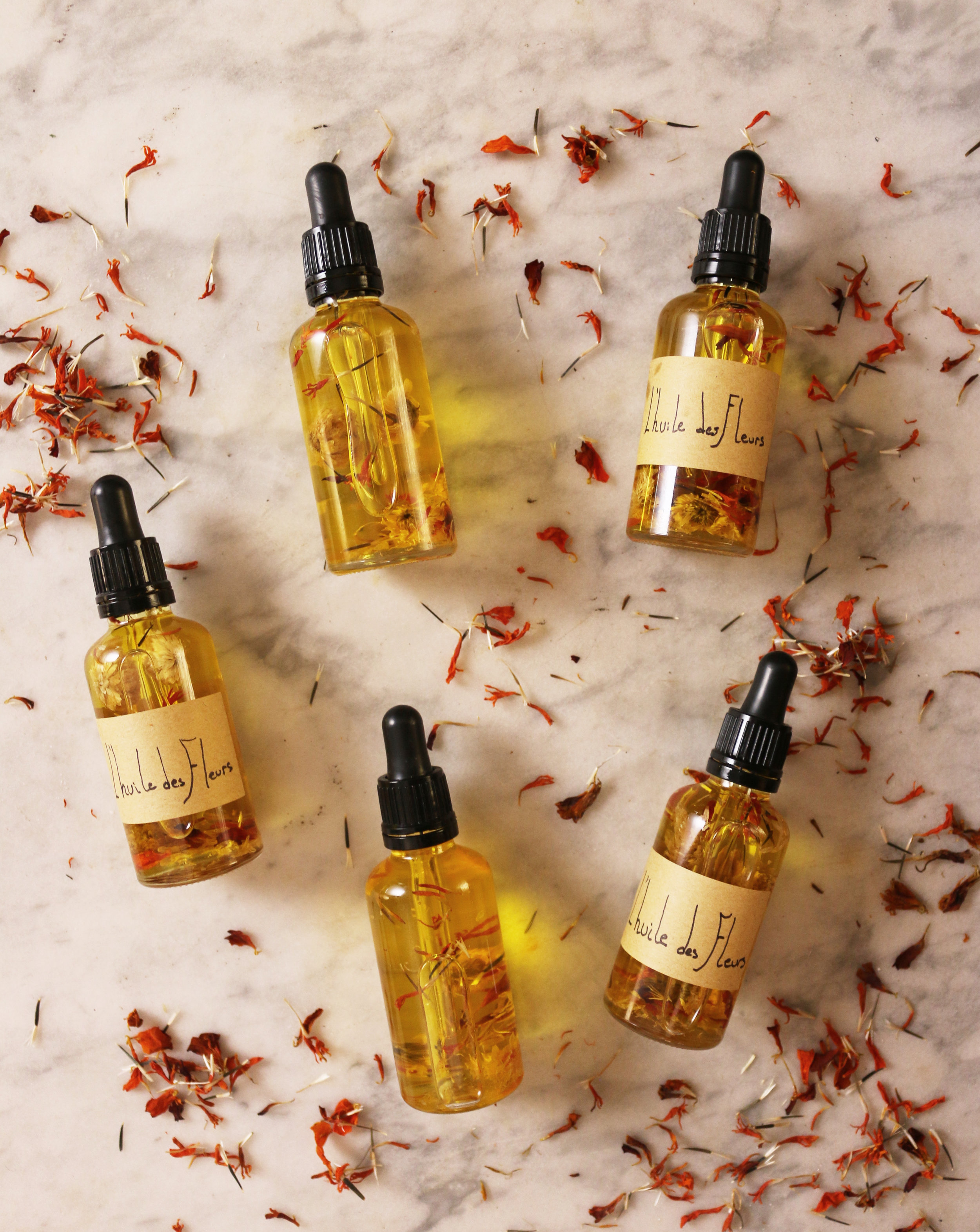Best Oils for Your Face
At long last “moisturizers” no longer reign as the go-to skin hydrator. People are finally starting to embrace the skin healing power of oils. After all, our epidermis is made up of skin cells connected via lipid membranes, all of which need nourishment in the form of antioxidants and fatty acids for repair and preservation. While moisturizers, often made up of fillers, chemicals, preservatives and refined waxes, create a seal on top of the skin, oils enter deep into the layers of the epidermis, hydrating the skin in a far more effective way.
And no, oils will not make your skin oily, but help to balance our delicate sebum production system. The harsh chemicals in many moisturizers strip the skin of its natural sebum, sometimes causing it to produce even more oil (in the form of acne) than necessary.
But not all oils are created equally, especially when it comes to extraction processes. You always want to look for ethically-sourced, organic, cold-pressed oils. Do your background research before buying from a company. Quality and source is everything.
Almond Oil
Almond oil is packed with free-radical fighting vitamin E, an antioxidant that heals sun damage, reduces the signs of aging, and helps to fade scars.
Great source of magnesium, phosphorus, and copper.
Anti-inflammatory properties and reduces acne and redness.
Almond oil is excellent for hair due to its high biotin content that helps nourish and strengthen hair follicles and reduce damage to hair strands.
Argan Oil
This vitamin E and fatty acid-loaded oil is derived from trees native to Morocco.
While denser oils like castor and grapeseed oil reduce sebum production, and coconut and avocado act as incredibly rich moisturizers, argan oil falls in the middle of the spectrum, making it a great universal option for all kinds of skin.
Helps reduce inflammation caused by acne.
Helps balance over-sebum production and calm acne breakouts.
Effective at soothing eczema.
Excellent hair-nourisher, especially for thicker and African American hair.
Avocado Oil
Avocado oil is rich in fatty acids, vitamin E, potassium, lecithin and other antioxidants that are excellent for nourishing the skin.
Relieves inflammation from psoriasis and eczema.
Improves scalp health and fights dandruff.
Treats sunburned skin and protects against free-radical pollution damage.
Prevents and treats acne.
Accelerates wound healing and stimulates collagen production.
Acts as a light sunblock.
Blackcurrant Oil
Black currant oil contains about 15% gamma-linolenic acid, a potent fatty acid that nourishes and helps to heal and treat skin conditions such as eczema, dandruff and psoriasis.
The deep dark color of currant account for the high concentrations of reparative antioxidants (anthocyanins) that protect skin from free radical damage (sunlight, pollution, and chemicals).
The high vitamin C content of blackcurrant oil offers another skin-regenerative antioxidant punch and the B vitamins help soothe acne-inflamed skin.
Castor Oil
Castor oil comes from the seeds of a plant native to tropical areas of Africa and Asia. Although it is most commonly known for its laxative effects, it does wonders when applied to the skin.
The antimicrobial and anti-inflammatory properties of castor oil make it effective in treating acne. Its ricinoleic acid content can inhibit growth in the bacteria that can contribute to acne.
Rich in other fatty acids that improve smoothness, evenness and softness of skin while helping to promote tissue growth and repair.
Does not clog pores and reduces the chances of developing blackheads.
The triglycerides found in castor oil are also helpful in removing dirt and bacteria from the skin.
Grapeseed Oil
This oil is extracted from grape seeds after they have been used to make wine. It is important to use organic grape seed oil as grapes are a highly sprayed produce!
Fatty acids in grapeseed oil help to deeply moisturize skin.
Helps reduce the appearance of acne scars, promotes skin repair and helps to tighten pores and skin in general.
Unlike coconut oil, grapeseed oil is non-comedogenic, meaning it does not clog pores and leaves no greasy residue.
Reduces the appearance of spider veins.
Lightens dark circles and evens skin tone.
Protects from free-radical sun damage.
Promotes hair growth.
Jojoba Oil
This lightweight oil sourced from perennial North American plant is noncomedogenic and won't clog pores. It is one of the oils that is most similar to our skin’s natural sebum.
The high antioxidant-charged vitamin E and B-complex vitamins found in jojoba oil help with skin repair and protection from free-radical damage.
Hypoallergenic and great for sensitive skin.
Helps balance sebum production.
Promotes the synthesis of collagen.
Anti-inflammatory properties, also making it a great option for acne-prone skin.
Minimizes the appearance of scars and helps speed up wound healing (antibacterial properties).
Marula Oil
This lightweight, easily absorbed oil comes from the nutty fruit of a native (and sacred) South African tree.
Contains a wide spectrum of fatty acids: L-arginine and glutamic acid, which have hydrating and anti-aging properties. And palmitic, stearic, oleic, and myristic acids, which have emollient and moisturizing benefits
High antioxidant presence such as phenolic compounds and vitamins E and C helps fight free radical damage.
Helps prevent stretch marks.
Softens and evens skin complexion.
Balance sebum production and helps prevent acne from forming.
Nourishes scalp and hair from root to tip.
Virgin Coconut Oil
Always opt for virgin, cold-pressed coconut oil.
Do not put coconut oil on your face! Coconut oil can clog pores and can be problematic for sensitive and acne-prone skin. However, coconut oil is a great (cost-effective!) option for nourishing skin on the body and the scalp.
Need to moisturize winter cracked or sun burnt skin? Slathering on coconut oil over your arms and legs. Avoid acne trigger zones like back, chest, neck and face.
Coconut oil is also amazing as a hair treatment, especially for dermatitis (mix in a few drops of oregano or eucalyptus essential oil and massage into scalp before washing off 20+ minutes later).
Don’t forget to add oil to your nails and cuticles as well! They need hydrating fatty acid vitamin love too!

